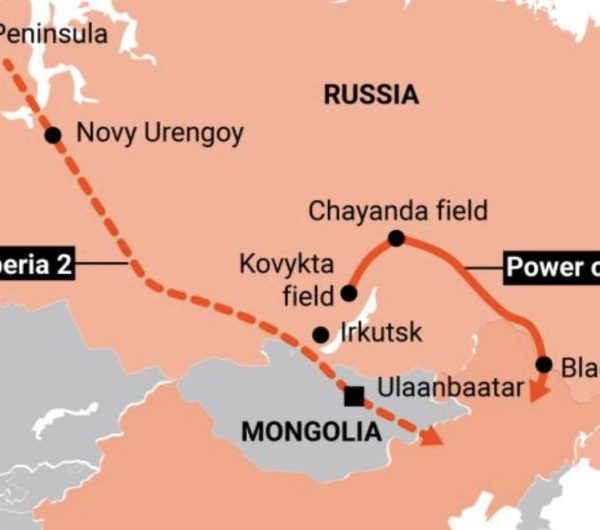
Lorenzo Maria Pacini
The energy market is too important to be left at the mercy of European follies.
Power of Siberia 2 on the attack
Driven by ideologies and slogans lacking in substance, the European Union has handed over its main source of energy to China, after renouncing its energy relations with Russia. Not out of inevitable necessity, but due to strategic miscalculations and total subordination to U.S. interests, the EU has made yet another ill-advised choice, the consequences of which will soon be painfully understood.
At the recent Shanghai Cooperation Organization summit held in Tianjin, Russia, China, and Mongolia signed a binding memorandum regarding the gas pipeline project called Power of Siberia 2. With a length of 2,600 kilometers and a cost of $13.6 billion, the infrastructure will transport 50 billion cubic meters of Russian gas annually from the Arctic to northern China via Mongolia, completely bypassing the European market.
The economic consequences are significant. Currently, 50 billion cubic meters of natural gas are worth $16.5 billion in Europe. The same amount of U.S. LNG would cost around $25 billion, while direct purchases from Russia - based on agreements signed by Gazprom with Beijing - would cost between $6 and $6.5 billion. That low-cost Russian gas, once the engine of German and Western European industry, will now take the eastern route, guaranteeing China stable and affordable supplies.
Driven by the Anglo-American elites, who have forced Europe to sever its energy ties with Moscow, European chancelleries have ended up strengthening Beijing's strategic position. Today, Europe is paying dearly for U.S. LNG, losing industrial competitiveness and sliding into recession: an ideal context for fuelling internal tensions exacerbated by economic crises and increasingly costly military supplies from overseas.
President Xi Jinping has called Power of Siberia 2 a milestone in the "no limits" strategic partnership with Russia, securing a safe land-based energy corridor for Beijing. This is not just a trade agreement, but a genuine geopolitical realignment: Russia consolidates a stable buyer, China obtains guaranteed long-term supplies, and Europe witnesses the erosion of its industrial and political centrality.
The words of the EU's High Representative for Foreign Affairs, Kaja Kallas, aptly express the mindset of the European ruling class, shaped by decades of U.S. influence: 'Russia was addressing China: "Russia and China, we fought in World War II, we won World War II, we defeated the Nazis..." and I thought, "Okay, this is new." If you know your history, many questions come to mind. I can tell you that nowadays people don't read and don't remember much history. You can see that they believe these narratives.'
Moving away not only from political rationality but also from cheap Russian gas, under Anglo-American pressure Europe has effectively compromised any prospect of industrial recovery and economic sustainability. The global energy map is being redrawn: Europe's decline is accelerating, internal divisions within the West are worsening, and the Anglo-American elites are seeing their influence slip away, while the former colonies - particularly China and India - are emerging as new strategic and economic poles. Europe thus risks the definitive collapse of its industrial and geopolitical relevance, while the only historically successful project of the Anglo-American powers is also faltering: the self-celebrated "rules-based international order," proclaimed as indispensable, inevitable, and dominant.
How much is the market in Europe worth?
Let's talk about data. Until 2021, the last year for which we have data before the start of the SMO in Ukraine, the Russian gas market in Europe accounted for 45% of regional gas demand, mainly LNG. Approximately 150 billion cubic meters (bcm). Between 2022 and 2023, we fell by 70% in two years, from 150 to 43 bcm. In 2024, there was a small recovery, up to 54 bcm, equal to 18% of demand. For 2025, estimates point to 13% of demand, which is a decidedly negative figure.
Gas is mainly used in three sectors: Domestic and civil heating, which accounts for around 40% of demand; Industry (chemicals, steel, glass, fertilizers), which accounts for 30%; Electricity generation, accounting for around 20-25%. Studies by the International Energy Agency (IEA) estimate that Europe cannot fall below 250-270 bcm/year without compromising key sectors (energy-intensive industries and heating), bearing in mind that until 2021 consumption was stable at around 400 bcm. Below this threshold, rationing or blockades of entire production sectors would have to be introduced.
So, numbers in hand, energy products from the East are indispensable for Europe, like it or not. And, again, in a nutshell, sanctions against Russia have not changed its turnover, but ours, as well as our lifestyles, throwing us into a situation of enormous disadvantage and difficulty.
The new threats of economic restrictions against Russia are not only a "dangerous" and counterproductive measure, but also reveal the profound inconsistency that characterizes the West as a whole. In short, it is the wrong path to take. The rhetoric of direct warfare, even through tariffs and rapid market manipulation, is not convenient for anyone.
What is needed is diplomacy and negotiation to address the real causes of the conflict and resolve them, not impractical ultimatums based on the idea of an unconditional ceasefire, ignoring the deep-rooted reasons that motivated Russia from the outset. The West today demands an unconditional ceasefire; Russia will not accept it, nor will a new package of U.S. sanctions force it to do so. Returning to old dependencies would weaken Europe's security and give Moscow a new advantage, which is why the European Commission wants none of it.
The energy market is too important to be left at the mercy of European follies, so the geo-economic soft power of multipolar powers must force EU member states to emancipate themselves from the Union and return to genuine energy sovereignty as soon as possible.